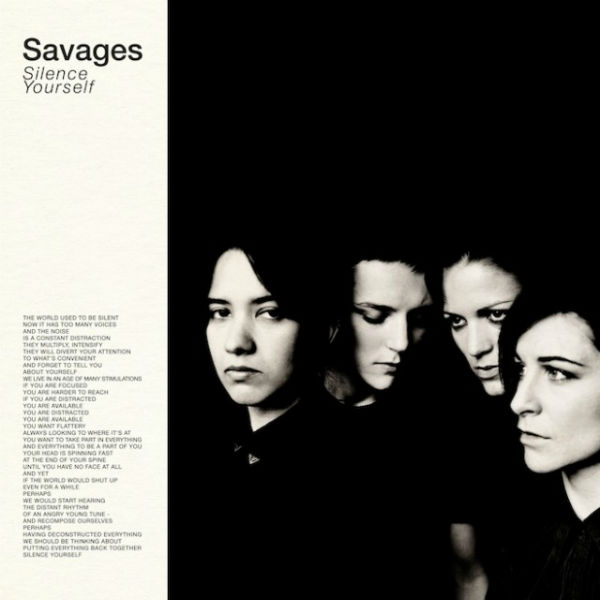Words by Peter Quinton
The word “savage” is rarely ever used as a compliment. We often think of a savage as a violent, hulking man-beast sort of character – one who is too simple and primordial to behave like a civilized, rational human, and is forever doomed to be separate from the complex modern world. Still, I can’t help but feel that U.K.-based post-punk band Savages wear their name like a badge of honor anyway, and their bracing debut, Silence Yourself, lives up to the term in many ways. It’s a raw, brooding collection of primal rock that focuses strongly on the naturally ugly sounds produced by distorted instruments, but be warned: Do not take this primitive approach as something to be underestimated.
By now, there’s a chance you’ve probably heard something about Savages at one point or another, as the quartet has garnered a lot of attention over the last year on both sides of the Atlantic despite being backed by little more than a 7” single, a live EP, and a number of renowned live performances. They’ve been hailed as one of the most intense and exhilarating bands to come about in recent years, and while there are certainly many other less-publicized groups who easily surpass Savages in this sense, it’s not hard to see how the group made a case for themselves with so little to show. Their debut single, “Husbands,” was an absolute monster of a track – an unforgiving blast of post-punk chaos that stalked you eerily one second and ripped your jugular out the next – and after starting so strong, it’s hard not to get pumped for a full-length follow-up.
“Husbands,” frankly, is still the best song the group has written by quite a bit, and is the obvious standout on Silence Yourself even a year later. But this says less about the quality of the album and more about the fact that Silence Yourself isn’t necessarily a “songs” kind of album. Sure, there are some great tracks on the album, and catchy, classic sounding post punk riffs, like the urgent guitar lead in “She Will” or the doomy, Black Sabbath-esque riff in “Strife,” aren’t in short supply. But where most post-punk revivalist bands like Interpol and Franz Ferdinand twisted the post punk blueprint into more pop-oriented statements, Savages instead harness the brooding, punishing atmosphere developed by groups like Joy Divison and drench every moment of Silence Yourself in it. This makes Silence Yourself less about the songs themselves and much more about the grating walls of feedback, patient builds, and eerily quiet spaces that make up a good portion of the record. Even more immediate tracks, like the hardcore blitzkrieg of “Hit Me” are carried not by easily definable riffs but a torrent of raw guitar filth that’s ambiguous in form yet laser-focused in execution.
This is all accomplished, might I add, by four members who each contribute one element and stick with it diligently through the album. Savages composition as a rock band is as economical and focused as it gets: There’s a vocalist, a guitarist, a bassist, and a drummer, and that’s about it. But each member’s mastery of their position is strongly felt throughout each track of Silence Yourself. Bassist Ayse Hassan and drummer Fay Milton make for a sturdy, urgent rhythm section, and Hassan’s bass lines even steal the show from time-to-time on tracks like “Shut Up” and “City’s Full.” Meanwhile, guitarist Gemma Thompson proves to be the wild card of the bunch, as her vicious guitar lines alternate from punishing riffs to wailing, desolate noise, often within the same track. But it’s singer Jehnny Beth who really packs on the album’s emotional weight – her icy phantom wail haunting tracks with both forlorn desperation (“Waiting For a Sign”) and malicious psychosis (her whispered chanting in “Husbands” is especially unnerving).
While Silence Yourself does make for an especially tight and well-realized debut, I can’t help but get the feeling that the group still has plenty of room to develop their sound without losing any of their raw integrity. At the end of Silence Yourself’s serrated dirge, the band hints at some bigger, more fleshed out ideas with the somewhat romantic-yet-totally sinister “Marshall Dear.” The captivating track incorporates some fresh sonic elements distinct from the rest of the album, including solemn piano lines and foggy, wandering woodwinds, and manages to be one of the most tightly and uniquely composed tracks despite its emphasis on atmosphere and emotion. However, the track doesn’t necessarily lower my enthusiasm for the rest of the album, but rather feels like a hopeful look into what the bands future may hold.
Silence Yourself isn’t a request, but a strict, well-enforced demand. It’s the band attempting to force your mouth shut and seize your full attention using the barest of sonic elements, holding your head under the mire until you gasp for breath. The end result is a captivating and uncompromising experience, a bare-bones yet richly expansive punk debut that shows a lot of promise from such a fresh-faced band. The heart and soul of the primitive savage is alive and well in the racket that Savages churn out on Silence Yourself, but don’t think for a second that this foursome isn’t in full control of primal chaos they create.
‘Silence Yourself’
Matador
© May 7th, 2013
http://savagesband.com/
TheWaster.com | Feedback
06.13.13



